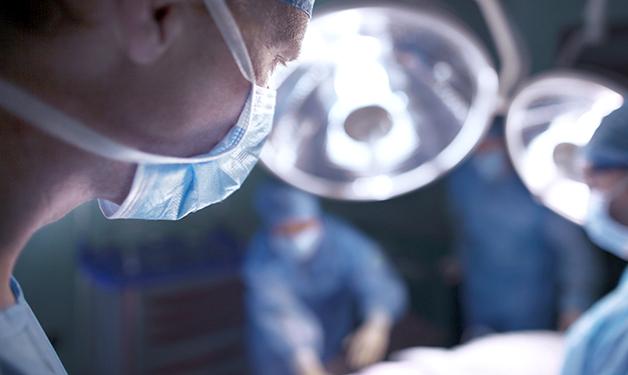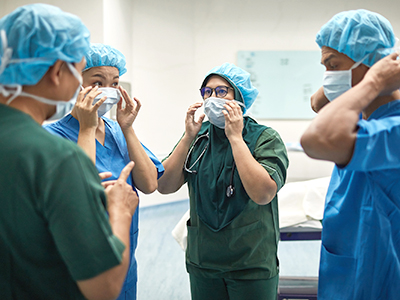
Student-led study compares popular remedies for unpleasant surgical smells.
Aspiring health care professionals often hear that if you want a career in medicine, you can’t be squeamish about blood. But what about bad smells? For those who work in operating rooms (ORs) the odours that accompany surgeries can be more than a little off-putting. People use a variety of remedies to combat the bad smells, but there is little scientific evidence as to what is the most effective. A team of medical students, under the leadership of Vancouver Coastal Health Research Institute scientist and plastic surgeon Dr. James Boyle, put their noses to the task of sniffing out the answer.

“Until you experience it firsthand, you cannot fathom how awful these smells can be. They are 100 times worse than what you encounter out in the world. We're talking excrement and wound odours like burned or necrotizing flesh.”
Dr. Aaron Van Slyke, a senior resident in plastic surgery who designed the study, says nurses and doctors try all sorts of smell-shielding remedies, from lip balms to herbal tinctures. Van Slyke’s cousin, a nurse, swears by toothpaste.
“We’ve all heard of many kinds of odor-masking techniques. But claims of success are anecdotal. We set out to determine not only the most effective, but also the most pleasant to use,” says Dr. Aaron Van Slyke.
The masking remedies tested by the team are all products people apply to the outside of their surgical mask—akin to a personal air freshener, but one that’s powerful enough to combat putrid smells. The products include: a strongly aromatic medical adhesive, an antiseptic herbal compound, toothpaste and cherry lip balm.

In the randomized control trial, 80 participants between the ages of 19 and 30 were confronted with a bad odour, and tested for a baseline reaction. Then they used four different masks coated with different products and one mask with no product. The participants were asked to rank how effectively each product dealt with the bad smell and how pleasant they were to use.
And what was the bad smell they tested? Everyone on the team agrees that Dr. Marija Bucevska and Rebecca Courtemanche had the worst assignment: to find the most revolting smell possible.
“We went through a lot of disgusting things like fish bait,” says Bucevska. “Finally, we settled on a product used by the U.S. military, in training, to replicate noxious odours. The name refers to the smelliest part of the human anatomy, and it more than lives up to its name.”
Short-term stench long-term benefit?
Who would willingly sign up to smell bad smells? Lindsay Bjornson, the lead author and a second-year medical student, was in charge of recruitment. She says her peers were actually keen to help out. “Many of my fellow students are anxious about what the clinical experience will be like. They are afraid of how bad surgical smells may be, and whether they will be able to handle them. This study helped with that anxiety by showing them there are effective techniques we can use.”

“These are skills that build future researchers. Whether you’re investigating a cure for cancer or how to deal with disgusting smells, it’s the same basic skill set. I’m really proud of all they accomplished,” says Dr. Jim Boyle.
As for the winner? After statistical analysis by team member Jeffrey Bone, all the products were found to be somewhat effective, but some were much more pleasant to use. The team is keeping the winner a secret for now, but they hope to ‘unmask’ their results in special holiday edition of the British Medical Journal which features lighter research still done with scientific rigour. Fortunately, the journal will not feature scratch and sniff options.


